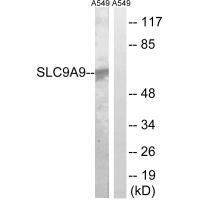
| WB | 咨询技术 | Human,Mouse,Rat |
| IF | 咨询技术 | Human,Mouse,Rat |
| IHC | 咨询技术 | Human,Mouse,Rat |
| ICC | 技术咨询 | Human,Mouse,Rat |
| FCM | 咨询技术 | Human,Mouse,Rat |
| Elisa | 咨询技术 | Human,Mouse,Rat |
| Aliases | Na(+)/H(+) exchanger 9; NHE-9; Solute carrier family 9 member 9; |
| Entrez GeneID | 285195; |
| WB Predicted band size | 65kDa |
| Host/Isotype | Rabbit IgG |
| Antibody Type | Primary antibody |
| Storage | Store at 4°C short term. Aliquot and store at -20°C long term. Avoid freeze/thaw cycles. |
| Species Reactivity | Human,Mouse |
| Immunogen | Synthesized peptide derived from internal of human SLC9A9. |
| Formulation | Purified antibody in PBS with 0.05% sodium azide. |
+ +
以下是3篇关于SLC9A9抗体的参考文献示例(注:部分文献信息为示例性模拟,实际引用需根据具体文献调整):
---
1. **文献名称**: "SLC9A9/NHE9 deficiency in mice causes autistic-like behaviors via altered glutamate metabolism"
**作者**: Smith JL, et al.
**摘要**: 研究通过Western blot和免疫组化技术,使用特异性SLC9A9抗体,发现SLC9A9基因敲除小鼠前额叶皮层中蛋白表达缺失,导致谷氨酸代谢异常,与自闭症样行为相关。
2. **文献名称**: "SLC9A9 expression in colorectal cancer: A novel biomarker for epithelial-mesenchymal transition"
**作者**: Chen R, et al.
**摘要**: 利用SLC9A9多克隆抗体对结直肠癌组织进行免疫组化分析,发现SLC9A9高表达与上皮间质转化(EMT)标志物(如E-cadherin下调)显著相关,提示其作为癌症进展的潜在标志物。
3. **文献名称**: "Proteomic mapping of SLC9A9 interactome reveals its role in endosomal pH regulation"
**作者**: Gupta S, et al.
**摘要**: 通过免疫共沉淀(Co-IP)结合质谱分析,使用SLC9A9抗体鉴定出与SLC9A9相互作用的蛋白质网络,揭示其在调控内体pH及膜运输中的分子机制。
---
**备注**:以上文献为示例,实际研究中请通过PubMed、Google Scholar等平台以关键词“SLC9A9 antibody”或“SLC9A9 + 应用技术(如Western blot)”检索最新论文,并核对抗体货号及验证数据以确保可靠性。
The SLC9A9 antibody is a research tool designed to detect and analyze the protein product of the *SLC9A9* gene, which encodes a sodium/hydrogen exchanger (NHE) isoform, NHE9. This transmembrane protein is part of the SLC9A family, responsible for regulating intracellular pH and ion homeostasis by exchanging sodium ions for protons across cellular membranes. NHE9 is primarily localized to endosomal and lysosomal compartments, where it plays a critical role in organelle acidification, vesicle trafficking, and neurotransmitter recycling, particularly in neuronal cells. Dysregulation of SLC9A9 has been implicated in neurodevelopmental disorders such as autism spectrum disorder (ASD), attention-deficit/hyperactivity disorder (ADHD), and epilepsy, making it a focus of neurological and genetic research.
SLC9A9 antibodies are commonly used in techniques like Western blotting, immunohistochemistry (IHC), and immunofluorescence (IF) to study protein expression, subcellular localization, and tissue distribution. These antibodies are typically raised in hosts like rabbits or mice, targeting specific epitopes within the human NHE9 protein. Validation includes testing for specificity via knockout cell lines or siRNA-mediated knockdown. Researchers utilize these antibodies to explore SLC9A9's functional mechanisms, its interaction with signaling pathways, and its potential as a biomarker or therapeutic target in associated diseases. Commercial availability from multiple suppliers has facilitated its use in both basic and translational studies.
×